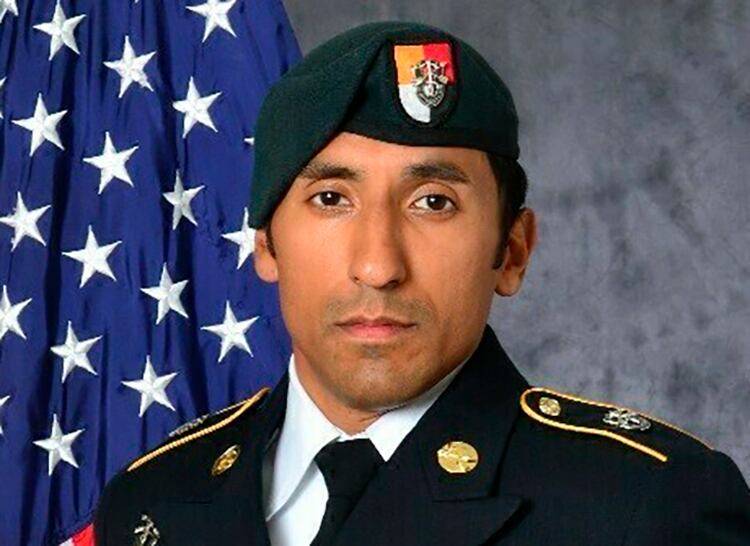A military jury found a Marine Raider on trial in the 2017 death of a Green Beret staff sergeant in Mali guilty of hazing, false official statements, conspiracy charges and involuntary manslaughter.
Gunnery Sgt. Mario Madera-Rodriguez was found not guilty of felony murder, the most serious charge along with burglary, though the jury did find him guilty of a lesser offense of “housebreaking.”
The jury came to their verdict late Thursday night after a day’s deliberations in the three-week trial at Norfolk Naval Station, Virginia.
Madera-Rodriguez was the last of four co-defendants charged in the June 4, 2017, strangulation death of Army Green Beret Staff Sgt. Logan Melgar.
RELATED

The defense argued from the outset that the death of Melgar was not intentional and was essentially a hazing incident gone wrong.
Prosecutors leaned on the expert knowledge of the men involved, saying their acts, even their planning, violated the Uniform Code of Military Justice and they knew the dangers of putting Melgar in a chokehold during their surprise attack on him.
The incident took place in Melgar’s bedroom at the off-site housing he shared with other special operators in Bamako, Mali.
The jury began listening to instructions regarding the sentencing phase Friday and are expected to hear testimony through next week, following the July 4 holiday. The jury will also hear sentencing arguments from attorneys on both sides possibly by next Thursday, officials said.
If sentenced at the maximum range of the most serious charge, involuntary manslaughter, Madera-Rodriguez could serve as much time as one of his co-defendants, who pleaded guilty and received a 10-year sentence.
The combined potential sentencing of all the guilty charges could technically result in a maximum possible 27.5-year sentence, dishonorable discharge and reduction in rank to E-1, according to prosecutors.
However, that would be if charges were to run consecutively, meaning each charge would be served before time on the next charge began. Most often, sentencing runs concurrently when convictions occur from the same crime. Then, the most actual time that a defendant would receive would be for the most severe charge.
Madera-Rodriguez took a gamble by going to trial.

Had he been found guilty of felony murder, the gunnery sergeant would have faced 20 years to life in prison.
The first three co-defendants pleaded between May 2019 and January 2021. In separate proceedings, they received either bad conduct or dishonorable discharges, rank reductions, other penalties and between one and 10 years in military prison.
Navy SEAL Chief SWO Tony E. DeDolph pleaded guilty to involuntary manslaughter and received 10 years in prison, reduction to E-1, forfeiture of pay and a dishonorable discharge.
Marine Raider Staff Sgt. Kevin Maxwell Jr. pleaded guilty to negligent homicide, conspiracy to commit assault, hazing, obstruction of justice and making false official statements. He was sentenced to four years of confinement, a reduction in rank to E-1 and a bad conduct discharge.
Navy SEAL Chief Special Warfare Officer Adam C. Matthews pleaded guilty to the conspiracy and related charges. He was sentenced to one year of confinement, reduction to petty officer second class and a bad conduct discharge.
Matthews had arrived in Mali only 24 hours before that final morning of Melgar’s life to check on DeDolph and other special operators deployed to the country to support the U.S. embassy mission countering terrorism in the country.
DeDolph told Matthews that he and others had problems with Melgar and wanted to conduct a hazing party on him to put him in check.
But later interviews suggested the opposite, that Melgar was fed up with “juvenile behavior” by DeDolph and other teammates and was eager to finish his deployment and return home.
Madera-Rodriguez, Matthews, DeDolph and Maxwell were drinking alcohol the night of June 3 when they began discussing what to do. That talk turned into plans as the quartet continued bar hopping.
They got a sledgehammer and duct tape and orchestrated a plan to break open Melgar’s bedroom door as he slept, subdue him and tie him up.
They then planned to take sexually compromising photos of Melgar with a near-naked Malian man they’d recruited for the stunt who had a belt tied around his neck to simulate a leash.
All of this was to put Melgar in line for a perceived slight when they were following him to an embassy party and he didn’t wait for them while driving in a separate vehicle, as well as other friction between Melgar and the team not detailed in open sessions of the trial covered by Military Times.
The four men, along with the Malian man, stacked up outside Melgar’s door and broke through with the sledgehammer.
A startled Melgar awoke and tried to fight them off. But DeDolph, a former professional mixed martial artist, wrestled with Melgar, putting him in a chokehold facedown into the bedding as the others began to tape his wrists and ankles.
That’s when Melgar went limp and stopped breathing.
The men stopped the attack and began lifesaving procedures, including a field-expedient tracheotomy, later taking Melgar to a nearby medical clinic where he was pronounced dead.
Immediately, they began the cover-up, which resulted in the false official statements charges and months-long delays in the investigation and charging.
The SEALs told the Marines they’d take care of the talking with investigators and made up a story that they had been practicing hand-to-hand combat drills in the early morning hours with Melgar when he stopped breathing.
They later lied, saying they thought Melgar had been drinking, which may have contributed.
But investigators later learned from friends of Melgar that he didn’t drink alcohol.
Todd South has written about crime, courts, government and the military for multiple publications since 2004 and was named a 2014 Pulitzer finalist for a co-written project on witness intimidation. Todd is a Marine veteran of the Iraq War.



